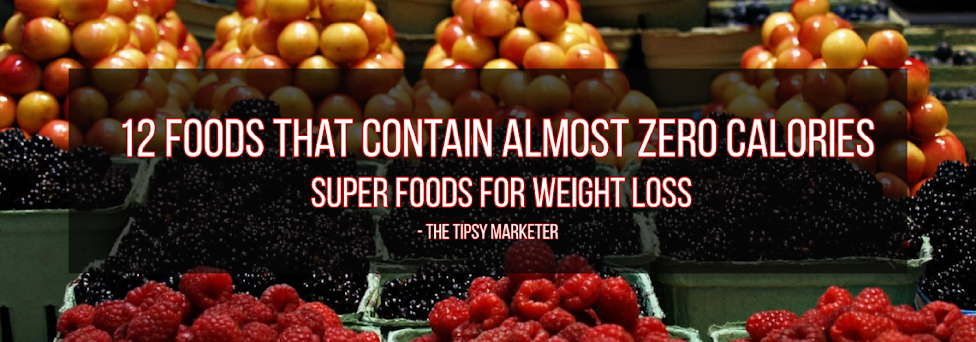12 Foods that contain almost Zero Calories: Super-Foods for Weight Loss
To make your weight loss journey easier and to help you fill your tummy while keeping a check on those unhealthy calories, The Tipsy Marketer has done due research to bring to you 12 Super-Foods that contain almost no calories. Eating more low-calorie foods, such as some fruits and vegetables, is a simple way to reach your target if you are trying to reduce your overall calorie intake.
Let us head straight to the magical list!
Carrots:
A 100gm serving of raw carrot will have the following nutritional values:
|
Calories |
28 |
|
Protein |
0.6 |
|
Fibre |
2.6 |
|
Carbohydrate |
5.7 |
|
Fat |
0.3 |
Celery:
Calories |
8 |
|
Protein |
0.7 |
|
Fibre |
1.7 |
|
Carbohydrate |
1 |
|
Fat |
0.2 |
Apples:
|
Calories |
52 |
|
Protein |
0.3 |
|
Fibre |
2.4 |
|
Carbohydrate |
13 |
|
Fat |
0.2 |
Beetroot:
Beetroots generally referred to like beets, are a prominent root vegetable used in many cuisines worldwide. Beets are filled with important vitamins, nutrients, and compounds of plants, some of which are therapeutic in nature.There are numerous health benefits of consuming beets which are rich in Vitamin C, Potassium, Magnesium, Folate and nitrates which help keep the blood pressure in check.
A 100gm serving of Beetroot will have the following nutritional values:
|
Calories |
37 |
|
Protein |
1.7 |
|
Fibre |
1.2 |
|
Carbohydrate |
7 |
|
Fat |
0.1 |
Cabbage:
Cabbage has an ample amount of Vitamin C and Vitamin K and antioxidants which include polyphenols and Sulphur compounds that are proven to help the body against free radicals and may reduce inflammation. Cabbage also contains insoluble fibre which keeps your digestive system happy! It also aids in reducing the ‘’bad’’ LDL cholesterol.A 100gm serving of Cabbage will have the following nutritional values:
|
Calories |
21 |
|
Protein |
1.3 |
|
Fibre |
1.9 |
|
Carbohydrate |
3.2 |
|
Fat |
0.5 |
Cucumbers:
Cucumbers are 95% water with a high content of potassium, magnesium and antioxidants. These low-calorie veggies contain several benefits, including valuable nutrients and hydrating properties. With its high water content, cucumbers are naturally low in calories, carbohydrates, sodium and fats.
A 100gm serving of Cucumber will have the following nutritional values
|
Calories |
10 |
|
Protein |
0.7 |
|
Fibre |
0.6 |
|
Carbohydrate |
1.5 |
|
Fat |
0.1 |
Papaya:
Papaya is an outstandingly healthy tropical fruit. It's filled with antioxidants that will help reduce inflammation, combat illness and keep you looking youthful.A 100gm serving of Papaya will have the following nutritional values
|
Calories |
43 |
|
Protein |
0.5 |
|
Fibre |
1.7 |
|
Carbohydrate |
11 |
|
Fat |
0.3 |
Papaya provides many health benefits in the form of Vitamin C, Vitamin A, high fibre with almost zero fat content. Lycopene in papaya can reduce cancer risk, it works by reducing free radicals that contribute to cancer progression.
|
Vitamin A |
102% |
|
Vitamin C |
1.5% |
|
Calcium |
1.4% |
Spinach:
Spinach is another leafy plant filled with minerals and vitamins and is also low in calories.It is rich in vitamin K, vitamin A and folate and contains more calcium than any other leafy vegetables. Spinach is abundant in Magnesium, Manganese and Iron. Eating this green veggie can benefit the health of the eyes, reduce oxidative stress and reduce levels of blood pressure and hence is a superfood.
A 100gm serving of Spinach will have the following nutritional values:
|
Calories |
24 |
|
Protein |
2.9 |
|
Fibre |
2.1 |
|
Carbohydrate |
1.3 |
|
Fat |
0.8 |
Tomatoes:
Tomatoes are amongst the world's most popular vegetables. They can be eaten in a sauce, fresh raw, cooked or pureed. Tomatoes are the main dietary source of the antioxidant lycopene, which has been correlated with several health benefits including a decreased risk of heart failure and cancer.They are also a great vitamin C, potassium, vitamin K and folate source.
A 100gm serving of Tomatoes will have the following nutritional values
|
Calories |
18 |
|
Protein |
0.9 |
|
Fibre |
1.2 |
|
Carbohydrate |
3.9 |
|
Fat |
0.2 |
Watermelon:
Watermelon’s origin is from southern Africa which has several health benefits including low-calorie count, lower blood pressure, a rich source of Vitamin C with decent amounts of vitamin B5 and Vitamin A (Beta-carotene).A 100gm serving of Watermelon will have the following nutritional values
|
Calories |
30 |
|
Protein |
0.6 |
|
Fibre |
0.4 |
|
Carbohydrate |
7.6 |
|
Fat |
0.2 |
Broccoli:
Broccoli has a nutrient-rich profile which is rich in vitamin A, vitamin Cvitamin K and a decent amount of Vitamin B array. A study found that steamed broccoli lowers the risk of cardiovascular diseases by reducing the amount of cholesterol in the body.
A 100gm serving of Broccoli will have the following nutritional values
|
Calories |
31 |
|
Protein |
3.7 |
|
Fibre |
2.4 |
|
Carbohydrate |
2.1 |
|
Fat |
0.8 |
Blueberries:
Blueberries primarily consist of 84% water and carbs and small amounts of protein. Blueberries are a good source of various vitamins and minerals that include Vitamin C & K, Manganese with a decent amount of copper and Vitamin E. Blueberries will reduce the risk of heart failure, enhance brain function, decrease blood sugar rates, and boost insulin sensitivity.A 100gm serving of Blueberries will have the following nutritional values
|
Calories |
57 |
|
Protein |
0.7 |
|
Fibre |
2.4 |
|
Carbohydrate |
14.5 |
|
Fat |
0.3 |
Do let us know in the comments, your favourite of this 12 super-foods!
The Tipsy Marketer is forever hungry to cover your favourite topics and know you better. We would love to hear your feedback, comments and interests!









Quite an informative blog
ReplyDeleteHey Hemant, thank you for the kind words!
DeleteTry using graphical representation instead of using numbers to represent quantity of something.
ReplyDeleteHey Aagosh, we'll surely try to come up with some informative graphics in our upcoming blogs :)
Delete